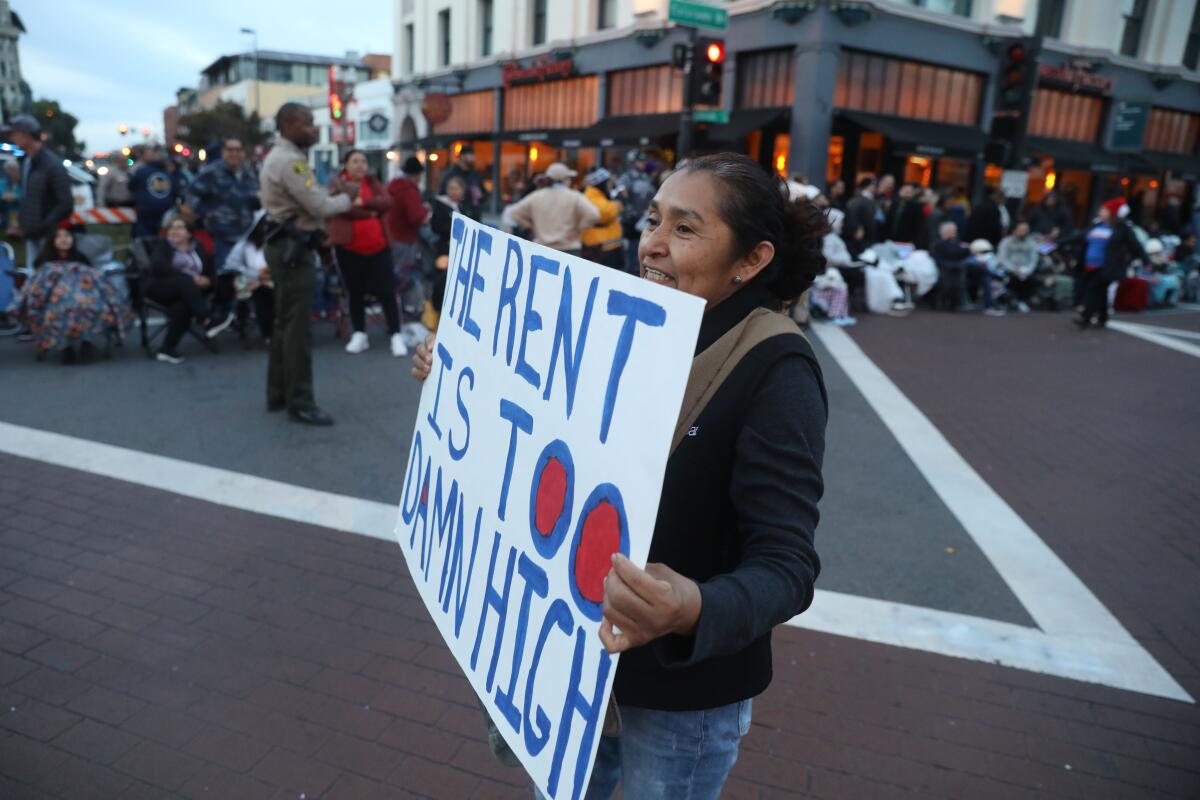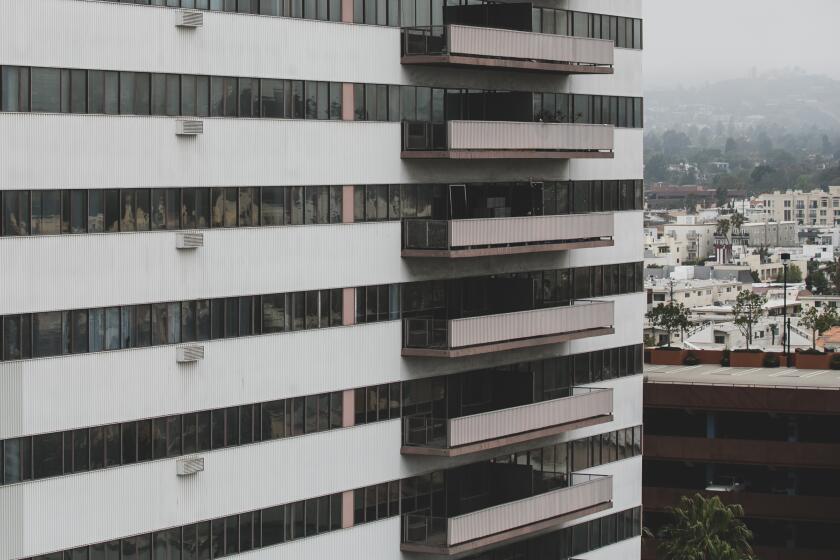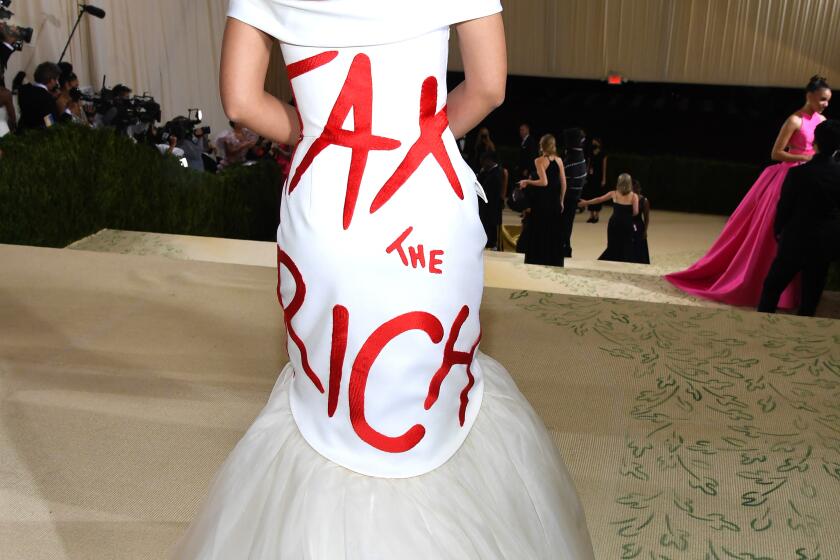If the economy is so great, why are evictions soaring?

- Share via
There is another migrant crisis brewing. Unlike the one at the southern border, this one will be all over the country.
A recent Harvard study found that half of the country’s renters are spending a third or more of their income on housing. Those are the people fortunate enough to find housing when there’s a nationwide shortage of affordable homes. Combine the rent line item with the soaring cost of child care, and don’t forget groceries, and … well, you can understand why evictions have spiked and homelessness has reached a record high.
Opinion Columnist
LZ Granderson
LZ Granderson writes about culture, politics, sports and navigating life in America.
We’re living through an age of contradictions. The United States is the strongest economy in the world, and Americans’ credit card debt has never been higher. The unemployment rate has been less than 5% for President Biden’s entire first term, and voters disapprove of his handling of the economy. Wall Street predicted that last year’s gross domestic product would grow by less than 2%, and instead it was 2.5% — yet the economy feels weak to a lot of people.
That’s because for many people, the economy is weak.
I’m a tenant in the mass eviction at Barrington Plaza. This developer decision could devastate L.A.
Douglas Emmett plans to kick out residents in all 577 occupied units of our rent-stabilized Westside building. That’s unnecessary and will worsen L.A.’s housing crisis.
Right now the top 1% has more money than the nation’s entire middle class. For Americans with the lowest incomes, rent is just the beginning of the worries.
Unaffordable rent is a continuation of the wealth redistribution that accompanied the economic policies of President Reagan.
As a political philosopher, I believe societies should set a cap on extreme wealth. Limiting wealth is the only way to address poverty and protect democracy.
Before disco, the top 10% shared 30% of the nation’s income, while the remaining 90% lived off the rest. Today, the bottom 90% is getting by with less than 60% of the income. The top 1% took in 14.6% in 2021, which is twice their 7.3% share in 1979, according to the Economic Policy Institute.
After 1979, Reagan convinced voters to make capital more important than people. Give the rich more, and the extra will “trickle down” — remember that? Greed is a part of capitalism, but it’s not a part of patriotism. Reagan’s characterization of our economy conflated those two concepts, and many Americans embraced that fallacy as truth. Those who struggled to achieve prosperity were viewed as lazy and unworthy of help. Something had to be wrong with them, the thinking went, because nothing was wrong with this “land of opportunity.”
Classifying the plant as a Schedule I illegal drug creates an opening for cartels to operate. Punitive taxation by states only fuels the black market.
This was the era when well-paying manufacturing jobs went elsewhere. This was when large, successful companies were able to rake in record profits, while hardworking employees began to rely on food stamps to feed their families.
And now Congress is trying to solve the housing crisis by offering housing developers more tax credits. So much for the invisible hand of the free market, right? Although there is a desperate need for more affordable housing, developers apparently do not make enough money to want to do it, so government has to dangle a carrot to ensure that thriving corporations will thrive even more.
Conservatives often talk of the country’s unsustainable spending. It isn’t federal debt that should worry them most, though. How much longer can 22 million people spend a third or more of their earnings on rent?
In 2023, some states saw eviction filings jump more than 50% compared with pre-pandemic levels — and back then, the unemployment rate was higher. That’s not sustainable either.
Whether it’s living off borrowings in order to avoid taxable income or reporting losses legally while still making money, the various ways billionaire owners end up paying a lower tax rate than many of their employees are well-documented. When rising costs are passed down to consumers — rent, baby formula, bacon — we are conditioned to blame the government and not the price-gougers. When gas prices are up, many point fingers at the White House, even though, of course, presidents don’t control gas prices.
This sorry state of the American economy is not attributable entirely to either party or any one presidential administration. This redistribution has continued on everyone’s watch. However, we are reaching a point where a lot of people are fed up with their hard work not paying off, and they’re going to take action. That’s why the Wall Street Journal dubbed 2023 “the year of the strike.” Workers saw the prosperity at the top and demanded their fair share.
Now more than ever, we need Congress to close the tax loopholes that have allowed trillions of dollars to be redirected away from the many and hoarded by the few. Because the rent crisis isn’t a new problem: It’s the latest incarnation of the one that started when policymakers began to pretend that greed is good.
More to Read
A cure for the common opinion
Get thought-provoking perspectives with our weekly newsletter.
You may occasionally receive promotional content from the Los Angeles Times.














